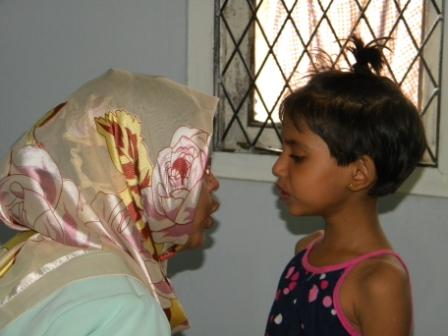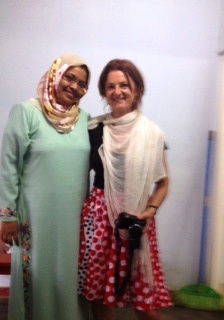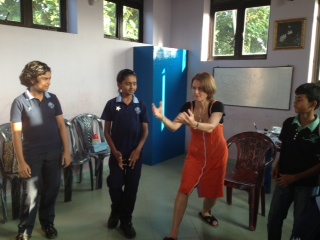
I met the laughing jolly director of the Brilliant Stars International School in her office: she, so warm and smiling, had a crying child in her arms, whom she was consoling. "Your Mom will be picking you up soon, darling!" she said. She spoke in such an articulate Oxford English that I was surprised.
"Oh, I learned in a convent," Ms. Hunniya Wazeer said. "Run by the British!"
She had also won the award for "Best Student" in Sri Lanka for her performance in its Open Education program, a correspondence program she chose because her parents wanted to protect her, a girl, from the nasty boys in school.
"Boys can push and hurt!" she said, with her boisterous laugh. "So school by correspondence for a girl is good."
With her father's help of 5,000 rupees, and her mother's help of 2,000 rupees (both her parents were educators) she started her own school in 1997, in the garage of her house, with four students.
Now she had 500 students. I saw them in their uniforms stroll around the courtyard, and sitting in their open-air classrooms. Some were in veils, others not. It's an ecumenical school, to "bring harmony," said the idealistic director, who won an award for just that. One teacher was teaching "the colors" to a lively group of five-year-olds at a blackboard in the yard. "Magenta!" the children cried.
I taught the literature course: seven highly alert students, age 15, who ably told me what they remembered about the novel, Anita Desai's The Village by the Sea, that they read the year before.
"At the end, Hari meets the watchmaker Mr. Panwallah," one girl explained to me. "Who teaches him that life is a wheel."
"You remember Mr. Panwallah's name?" I said -- astonished, as I could not, and I had finished the novel the night before.
They noted that the problems cited in the novel, set in India, are similar to those in Sri Lanka: drunken fathers, poverty, the need to travel to support one's family.
But in Sri Lanka, the women travel to work as maids in the Arab countries -- and the men travel to be laborers in places like South Korea.
Here, in the novel, Hari travels to Bombay, while his sister stays home. India won't let its women work abroad as maids, I was told, due to the notoriously high abuse in countries like Saudi Arabia and the Arab Emirates. But Sri Lanka -- my students told me -- won't let its children work: they are required to be in school until age 18.
"The novel implies that building factories in an impoverished area is good," I said. "Do you agree?"
"Yes!" they chimed.
"Would you want a factory in your own village?"
"No!" they chimed.
"Would you ever work in a factory yourself?"
I knew the answer already: these were the students of Matara who could afford to go to a private school, unless lucky enough to be invited on scholarship.
"Factory? No, no, no!" the students all wrinkled their faces.
"Goodbye!" I said -- and off I went off to teach "leadership skills" to eight-year-olds. I turned them into elephants and lions, and they all squealed in laughter.




